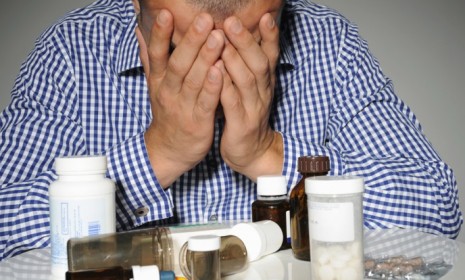Can horse tranquilizers cure depression?
Pharmacologists think ketamine — a dangerous "party drug" sometimes known as Special K — could help sufferers of depression. How on earth would that work?

A free daily email with the biggest news stories of the day – and the best features from TheWeek.com
You are now subscribed
Your newsletter sign-up was successful
Could one of the most potent, and potentially dangerous, "party drugs" be the answer for the roughly 15 million Americans who suffer from depression? Possibly, say pharmacology researchers at Yale University, who believe that a milder form of ketamine — a heavy-duty tranquilizer popular amongst party-goers for its hallucinogenic qualities — could break new ground as an unusually fast-acting and widely tolerated anti-depressant. A quick guide:
What is ketamine?
A tranquilizer powerful enough to sedate a horse that was developed in the 1960s and used as an anaesthetic in Vietnam. Sometimes known as "Special K," it's since gained popularity as a recreational drug, even though a large dose can trigger psychotic episodes or plunge users into the dreaded "K-Hole," a state of narcosis in which users feel disconnected from their physical selves.
The Week
Escape your echo chamber. Get the facts behind the news, plus analysis from multiple perspectives.

Sign up for The Week's Free Newsletters
From our morning news briefing to a weekly Good News Newsletter, get the best of The Week delivered directly to your inbox.
From our morning news briefing to a weekly Good News Newsletter, get the best of The Week delivered directly to your inbox.
How can it help depression?
In tests with rats, researchers at Yale University found that ketamine quickly activates enzymes that help reverse the effects of depression. The enzymes — known as mTOR — cause a chain reaction, flooding the prefrontal cortex with proteins that restore connections in the brain damaged by depression and stress.
Don't we already have effective antidepressants?
We do, but ketamine is (potentially) better. Ketamine's antidepressive effects kick in within hours of taking it, whereas common drugs like Prozac and Zoloft can take weeks to take effect. "It's like a magic drug — one dose can work rapidly and last for seven to 10 days," says Dr. Ronald Duman, leader of the study. In addition, the researchers found that as many as 70 percent of patients resistant to normal antidepressants responded well to ketamine.
A free daily email with the biggest news stories of the day – and the best features from TheWeek.com
Are we likely to see this in drugstores soon?
No. Even Yale's pharmacology department concede that "further analysis" is needed before ketamine could be tested on human subjects in pill form (so far, it's only been administered intravenously in carefully controlled clinical settings). It's more likely that scientists will isolate "other drugs targeting the same pathway" as ketamine, says Laura Blue at Time. Besides, the drug is still a "controlled substance." It's unlikely the FDA will be overturning that classification anytime soon.
Sources: Time, Fox News, L.A. Times
-
 Nordic combined: the Winter Olympics sport that bars women
Nordic combined: the Winter Olympics sport that bars womenIn The Spotlight Female athletes excluded from participation in demanding double-discipline events at Milano-Cortina
-
 Samurai: a ‘blockbuster’ display of Japanese heritage
Samurai: a ‘blockbuster’ display of Japanese heritageThe Week Recommends British Museum show offers a ‘scintillating journey’ through ‘a world of gore, power and artistic beauty’
-
 BMW iX3: a ‘revolution’ for the German car brand
BMW iX3: a ‘revolution’ for the German car brandThe Week Recommends The electric SUV promises a ‘great balance between ride comfort and driving fun’